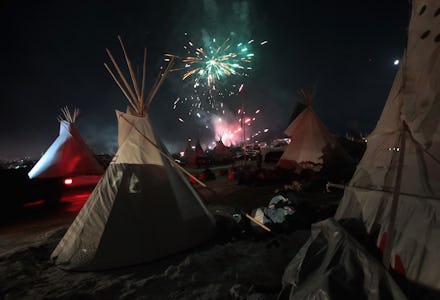The fight at Standing Rock isn't over, but vital support and the media are packing up

CANNON BALL, N.D. — Victory has been declared at Standing Rock. The media are clearing out, packing up satellite trucks and heading home. White allies who showed up in solidarity are breathing a sigh of relief. For them, the day is won, the black snake is dead, and it's time to head home.
But for the indigenous people they are leaving behind, the fight will rage on, harder than ever before.
The Lakota Sioux people and their guests from around the globe built a veritable small city at Oceti Sakowin Camp in order to hold ground at Standing Rock, and now that the harsh North Dakota winter is settling in, they could be left with a bigger fight and fewer resources to fight it if the battle continues.
The police haven't pulled back from the front lines, and the Dakota Access Pipeline company has no intention of leaving either.
"It's a distraction," Oceti Sakowin Camp volunteer Ethan Braughton said in an interview. "If they were leaving, they'd take the razor wire and all their vehicles, but they're still continuing to get the drill pad ready. They're not going anywhere, they just want us to leave."
Big money will fight on
Skimming the headlines, one might think that the Dakota Access Pipeline is dead, but the truth is more complicated. The Army Corp of Engineers declined to grant Energy Transfer Partners, the corporation building the pipeline, the easement necessary to cross under Lake Oahe, and they called for environmental impact studies for alternative routes.
But ETP doesn't intend to stop plowing through Sioux treaty lands, and Republicans are already bragging that once Donald Trump is in office, the pipeline will carry on as planned. The company already spent approximately $3.7 billion on finishing 85% of the pipeline.
"As stated all along, ETP and SXL are fully committed to ensuring that this vital project is brought to completion and fully expect to complete construction of the pipeline without any additional rerouting in and around Lake Oahe," Energy Transfer Partners wrote in a release after the announcement. "Nothing this administration has done today changes that in any way."
It's unclear how ETP will carry on, but one rumor on the ground here at camp is that Energy Transfer Partners will continue to work and incur expensive daily fines — at this point, that's just a widely circulated theory at Standing Rock.
The short-term victory against the pipeline effort was won by putting bodies on the line to occupy territory. The unintended consequence of celebration could be that those bodies become a scarce resource.
Using hope as a weapon
When the Morton County Sheriff's department announced, falsely, that there would be $1,000 fines to people bringing supplies into Standing Rock, people weren't deterred. When the North Dakota Governor Jack Dalrymple announced, falsely, that Standing Rock would be forced to evacuate, reinforcements still came.
Now, many of the Lakota Sioux and the Standing Rock resistance allies believe that all of the fanfare around the declared victory will just be another attempted deterrent, but this time using the illusion of success to convince the Sioux that their job is done, and that they can head home.
"They're just making it look like they're going to get out of here so people leave and we lose our numbers," Braughton said. "It's like the opposite of scare tactics — giving people hope where there is none."
Even if the media turns its attention away and supporters leave the treaty lands, many of the Lakota Sioux have permanently settled at Standing Rock. It's an area of the North Dakota plains that the indigenous rarely settle due to harsh winters, and the camp is already struggling to winterize structures and keep the roads clear as the first blizzards set in.
But they're not leaving.
"It's not over until they give this land back," Tiger Forest, who's been staying with the Lakota Sioux, said while taking shelter from the blizzard. "This is a fight for water, and for sacred land. They're still going to need support here."
"It's not over."
.